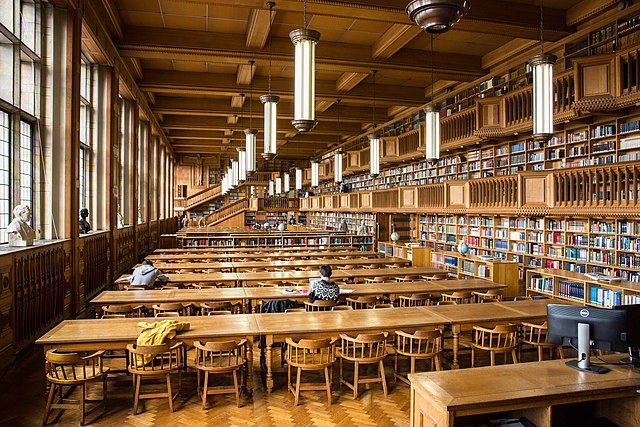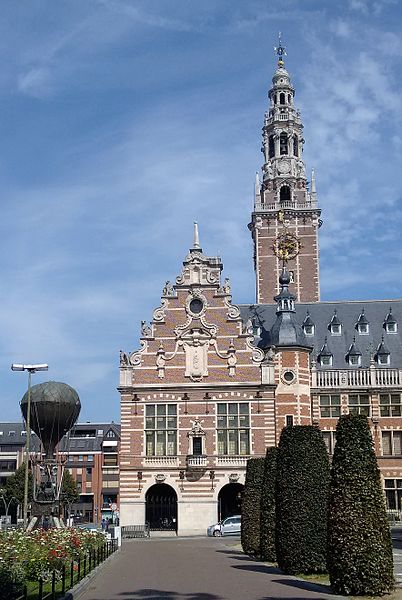
Libraries of the World: KU Leuven Libraries, Belgium
The Catholic University of Leuven (KU Leuven) is a research university in the Dutch-speaking town of Leuven in Flanders, Belgium. It prepares students for careers in education, research, and services in the sciences, engineering, humanities, medicine, law, and social. KU Leuven’s motto in English is Seat of Wisdom or Seat of Knowledge.
It was originally established almost 600 years ago, in 1425. In the 2017-18 academic year, just over 58,000 students were enrolled in KU Leuven, with over 4000 in the doctoral programme. The main campus is in Leuven (spelled Louvain in French), capital of the province of Flemish Brabant in Belgium. It is located about 16 miles east of Brussels.
KU Leuven is the largest and oldest university of the Low Countries, a coastal lowland region in northwestern Europe that include the nations of Belgium, Luxembourg, and the Netherlands, as well as today’s French Flanders. University Hospitals Leuven (UZ Leuven), is associated with KU Leuven as an academic hospital.
UZ Leuven is one of the largest hospitals in Europe, with almost 2000 beds and over 9,000 employees. Students at the TU Faculty of Health Sciences may be interested to know that on the UZ Leuven website, its role as a teaching and research hospital is explained:
- Research is, in addition to patient care and education, one of the missions of a university hospital. University Hospitals Leuven tries to stimulate doctors and nurses to actively contribute to scientific research.
- Medical staff members who invest part of their time in scientific research, develop the required scientific insight and expertise to be able to evaluate the most recent developments and technologies, and apply these in patient care.
Although the main language of instruction at KU Leuven is Dutch, several programs, especially for graduate degrees, are taught in English.

The Leuven University Libraries have 24 branches. They gradually developed from the 1600s, until at the start of the First World War, German enemy combatants set fire to the university hall and library, destroying many cultural treasures. A principally American fundraising effort to rebuild the library resulted in a new university library, which opened in 1928 as a gift from the American people to the city of Leuven and KU Leuven.
The new library would be destroyed by artillery fire in the Second World War in 1940. Only 15,000 books from a collection of 900.000 books survived. The library was again rebuilt and reopened in 1951, as an exact replica of the building designed by the American architect Whitney Warren. Among its outstanding collections is the personal library of Professor Henry de Vocht (1878-1962) an expert in Germanic philology in Leuven.
In 2015, an international academic conference, What Do We Lose, When We Lose A Library? was held in Leuven on the occasion of the centenary of the first burning of the Leuven University Library. The symposium was copresented by KU Leuven, the Goethe-Institut Brussels and the British Consulate in Brussels. Conference proceedings, published with support from the United Nations Educational, Scientific and Cultural Organization (UNESCO) noted that the theme of damage to libraries and books is a very current one, with worldwide impact:
The burning or destruction of books—and material heritage—is a symbol of so much more. What does a community lose, what does a city or country lose, when a library is turned to ashes? Examples come from all times and places. We can think for example of the destruction of a library in Alexandria in the far past, the demolition of a library of the Jesuits in China, the library fires in Leuven in 1914 and in 1940, the destruction of manuscripts in Chartres and Warsaw during the Second World War and the ruined libraries in Croatia and Sarajevo at the end of the twentieth century. The threat to the library in Timbuktu in 2012 and the very recent destruction of books and archives in Mosul, Aleppo and Sanaa complete this sad list. The worldwide protection of libraries will therefore stay one of the biggest challenges for the conservation and spread of knowledge.
The goal was to study how libraries can best protect their collections and how digital technology and advanced imaging techniques may help preserve traditional documentary heritage for future generations.

Planning for the future
The director of KU Leuven Libraries is Dr. Hilde Van Kiel. She has published scholarly articles on electronic library collections; e-journals in business planning for digital libraries; and how librarians and researchers can work together to control the dissemination of scientific information.
In 2016, Dr. Van Kiel informed a publication of the Flemish Association for Libraries, Archives and Information Management (VVBAD):
We owe it to the university of the size of KU Leuven to be pioneers.
VVBAD is a nonprofit organization for professionals working in libraries, archives and documentation centres in Flanders, the Dutch-speaking part of Belgium. VVBAD was founded in 1921 and represents approximately 3500 information professionals. According to its website,
- VVBAD advocates access to information and the transfer of knowledge, essential for an inclusive society.
- VVBAD organizes seminars, workshops and foreign study tours.
- Informatie aan Zee is our biennial conference for the library and archive sector.
- VVBAD offers news and information for the information professional. META is our magazine for libraries and archives.
In the preface to a library report, Dr. Van Kiel wrote that 2016 was a utopian year for Leuven and the KU Leuven Libraries.
She was referring to local commemorations of the printing in Leuven of the book Utopia, a work of fiction and socio-political satire by Thomas More. Considered a saint in the Catholic Church, Thomas More was an English lawyer, social philosopher, and humanist. His Utopia is about the political system of an imaginary, ideal island nation. The TU Library owns some editions of More’s Utopia as well as books about its importance.
KU Leuven Libraries celebrated the occasion in 2016 with an exhibit, Utopia & More which attracted over 12,000 visitors.
The website of KU Leuven Libraries describes its strategic policy as
- to focus on those developments and activities we believe are essential to support our university’s objectives. This focus is necessary to complete the mission we have set out together with the Academic Board:
- To grant researchers optimal access to the essential sources and tools for their research. Together with various other units of KU Leuven, we guide the whole research process from the creation of data to the publication of results.
- To ensure an excellent experience for our students. In close partnership with lecturers at KU Leuven, we guarantee that our resources and the expertise of our employees give graduated students the information and digital literacy needed to start the next phase in their careers.
- To ensure that our rich collections and our buildings remain a central tenet in the cultural identity of KU Leuven and its connection to society at large.
- To aspire to the highest quality in all our services, from the handling of our heritage to the systems we provide.
- To continually sharpen the expertise of our staff through education, projects and active participation in academic activities.
Among policy goals will be:
- expansion and intensification of digitisation within a structural framework.
- further implementation and expansion of our policy regarding open information with a focus on an as broad as possible presentation and provision of the digitised collections.
- A widespread digitisation policy with structural guarantees is our long term goal.

(All images courtesy of Wikimedia Commons)
